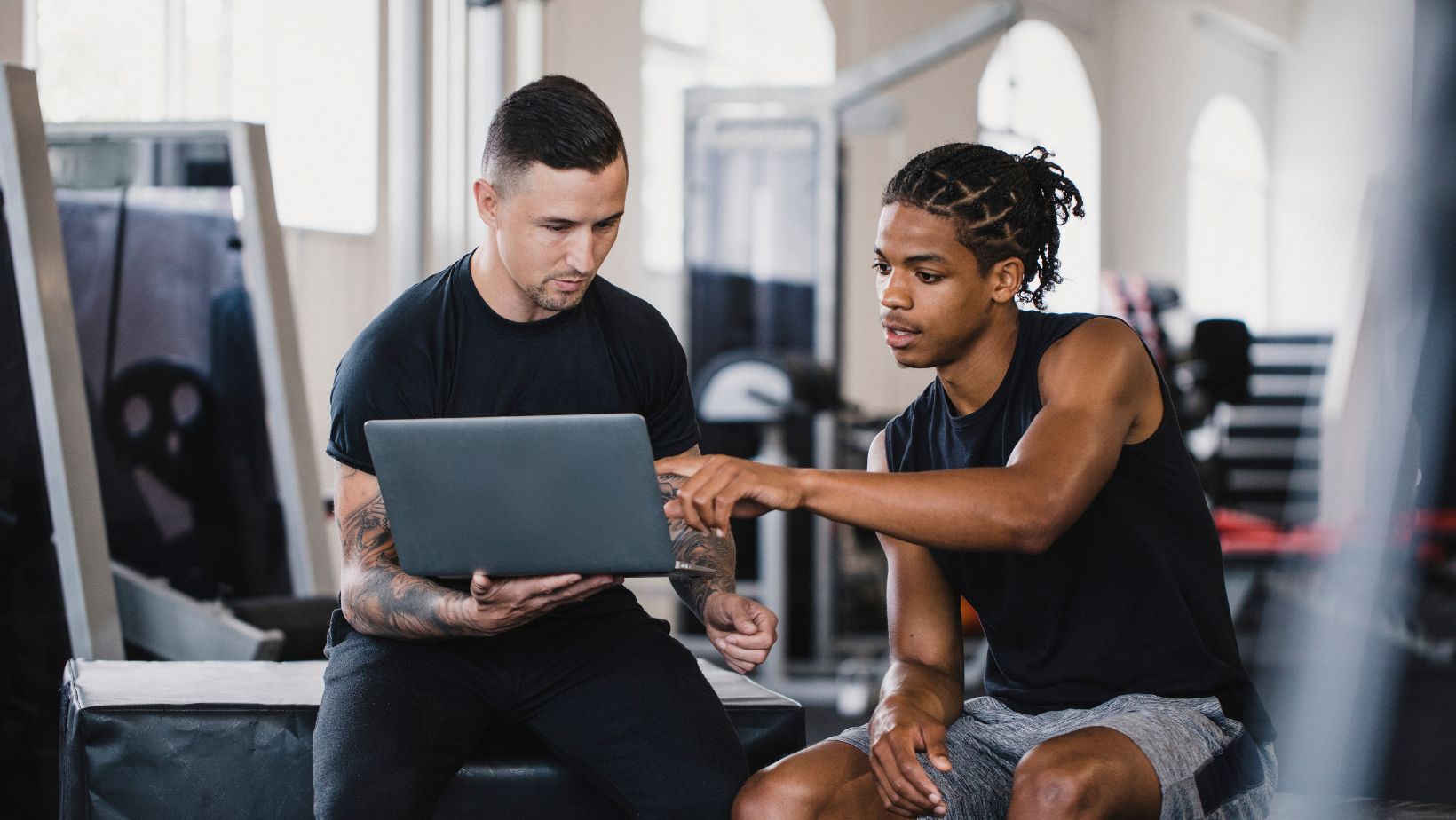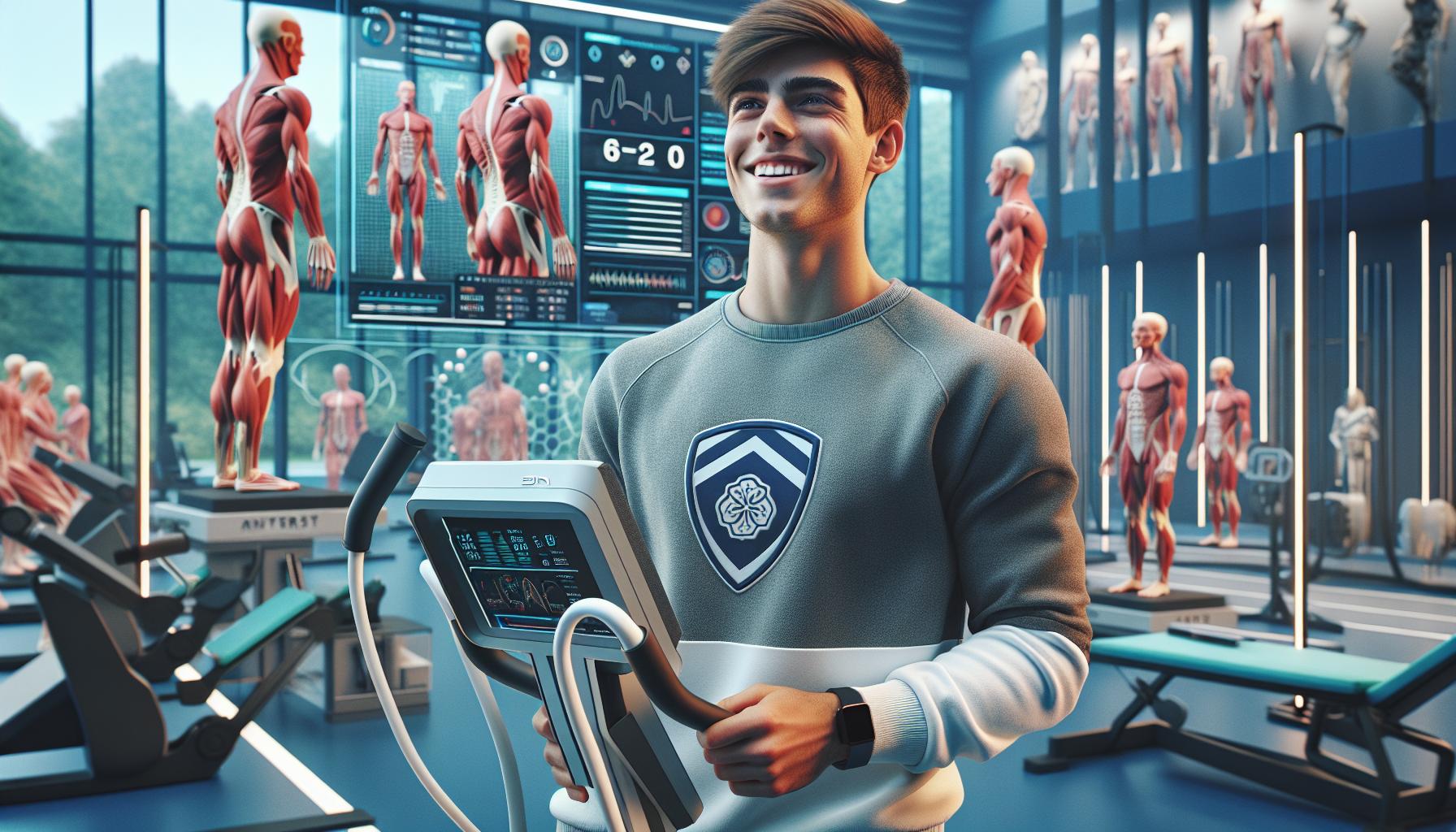As a sports science graduate, I’ve discovered that this fascinating field combines my passion for athletics with cutting-edge scientific principles. A sports science degree explores the complex relationship between human performance, physical activity, and health through various scientific disciplines.
I’ve found that this interdisciplinary program delves into anatomy, physiology, biomechanics, psychology, and nutrition. Whether you’re interested in becoming an athletic trainer, sports therapist, or performance analyst, this degree provides the foundation needed to excel in the dynamic world of sports and exercise. Throughout my journey, I’ve learned that it’s more than just studying how athletes move – it’s about understanding the science behind peak human performance.
Key Takeaways
- A sports science degree combines scientific principles with athletic studies, covering anatomy, physiology, biomechanics, psychology, and nutrition
- The program integrates both theoretical knowledge and practical experience through laboratory sessions, research methods, clinical placements, and hands-on performance testing
- Core components include exercise physiology, biomechanics, sports psychology, and clinical practice, providing a comprehensive understanding of human performance
- Career opportunities span diverse sectors including professional sports teams ($45K-$150K), healthcare facilities ($45K-$85K), and research institutions ($35K-$90K)
- Leading universities offer specialized facilities, research funding, and industry connections, with employment rates above 93% for graduates
- The field shows strong growth potential with a 19% higher-than-average employment rate and increasing demand across professional sports, healthcare, and research sectors
What is Sports Science Degree
A sports science degree combines scientific principles with athletic performance studies to analyze human movement, physiology, and sports psychology. During my studies, I learned that this degree integrates multiple disciplines: exercise physiology, biomechanics, sport psychology, nutrition, and motor learning.
The curriculum structure includes:
- Laboratory sessions analyzing movement patterns in specialized motion capture facilities
- Research methods courses teaching data collection, analysis, and interpretation
- Practical assessments conducting fitness tests and performance measurements
- Clinical placements working with athletes and sports teams
- Scientific writing modules developing evidence-based reporting skills
Core subject areas covered in the program:
- Anatomy & Physiology – studying body systems, muscle function, and cardiorespiratory responses
- Biomechanics – analyzing force production, movement efficiency, and injury prevention
- Sports Psychology – examining motivation, mental training, and performance enhancement
- Exercise Physiology – investigating energy systems, training adaptation, and recovery
- Sports Nutrition – exploring dietary requirements, supplementation, and performance fueling
The degree incorporates practical components:
- Performance testing using advanced equipment like VO2 max analyzers
- Biomechanical analysis through 3D motion capture technology
- Body composition assessment via DEXA scanning
- Strength and power measurement with force plates
- Recovery monitoring using heart rate variability tools
The program emphasizes evidence-based approaches through:
- Critical analysis of peer-reviewed research
- Statistical analysis of performance data
- Development of research methodologies
- Implementation of scientific protocols
- Application of measurement techniques
This academic framework creates a foundation for understanding human performance optimization in athletic contexts, combining theoretical knowledge with hands-on experience.
Core Components of Sports Science Programs
 A sports science degree program integrates four essential disciplines that form the foundation of athletic performance studies. I’ve observed these components work together to create a comprehensive understanding of human movement science.
A sports science degree program integrates four essential disciplines that form the foundation of athletic performance studies. I’ve observed these components work together to create a comprehensive understanding of human movement science.
Exercise Physiology
Exercise physiology examines the body’s responses to physical activity. I analyze cellular adaptations including VO2 max improvements metabolic changes during exercise. The coursework covers cardiovascular function respiratory responses muscular adaptations energy systems including:
- ATP production pathways in different exercise intensities
- Lactate threshold measurements through metabolic testing
- Cardiovascular adaptations like stroke volume heart rate variations
- Neuromuscular responses during strength power training
Biomechanics and Kinesiology
Biomechanics applies physics principles to analyze human movement patterns. I study force production joint mechanics movement efficiency using:
- 3D motion capture systems for gait analysis
- Force plate measurements for ground reaction forces
- EMG sensors to assess muscle activation patterns
- Kinematic analysis of sport-specific movements
Sports Psychology
Sports psychology explores mental aspects affecting athletic performance. I examine psychological factors including:
- Mental training techniques for focus enhancement
- Arousal regulation strategies for competition
- Team dynamics leadership development
- Performance anxiety management protocols
- Goal-setting frameworks for athletes
- Therapeutic modalities for injury treatment
- Taping strapping methods for joint support
- Rehabilitation program design protocols
- Emergency response procedures
- Injury assessment documentation systems
Career Opportunities for Sports Science Graduates
A sports science degree opens diverse career paths across athletics, healthcare, and research sectors. My experience shows that graduates possess specialized skills valued in performance optimization, rehabilitation, and scientific investigation.
Professional Sports Teams
Professional sports teams employ sports scientists in specialized roles including performance analysts, strength conditioning coaches, and sports physiologists. I’ve observed that teams in the NFL, NBA, and MLB integrate sports science graduates into their performance departments to monitor athlete data, analyze biomechanical metrics, and implement evidence-based training protocols. Key positions include:
- Performance Director ($75,000-$150,000 annual salary)
- Sports Data Analyst ($55,000-$95,000 annual salary)
- Strength & Conditioning Coach ($45,000-$85,000 annual salary)
Healthcare and Rehabilitation
The healthcare sector offers robust opportunities in clinical settings, sports medicine facilities, and rehabilitation centers. My work in this field encompasses roles such as:
- Clinical Exercise Physiologist
- Sports Therapist
- Cardiac Rehabilitation Specialist
- Athletic Trainer
| Healthcare Role | Average Salary | Required Certification |
|---|---|---|
| Clinical Exercise Physiologist | $55,000-$75,000 | ACSM-CEP |
| Sports Therapist | $45,000-$85,000 | NSCA-CSCS |
| Athletic Trainer | $48,000-$70,000 | BOC-ATC |
Research and Academia
Research institutions and universities create pathways for sports science graduates interested in scientific investigation and education. I’ve contributed to research projects focusing on:
- Exercise physiology studies
- Biomechanical analysis
- Performance enhancement protocols
- Sports psychology research
- Research Assistant ($40,000-$55,000)
- Laboratory Coordinator ($45,000-$65,000)
- Sports Science Lecturer ($60,000-$90,000)
- PhD Research Fellow ($35,000-$45,000 stipend)
Required Skills and Qualifications![]()
A sports science degree requires specific academic credentials combined with physical capabilities to effectively study human performance. The program demands both theoretical knowledge and practical abilities to succeed in this field.
Academic Prerequisites
I’ve found these essential academic qualifications for entering a sports science program:
- A high school diploma or equivalent with a minimum GPA of 3.0
- Strong grades in biology, chemistry, physics & mathematics
- SAT scores above 1200 or ACT scores above 25
- Advanced placement (AP) courses in sciences provide advantages
- Basic statistical knowledge for research methodology
- Computer literacy for data analysis software
- Research writing capabilities for scientific reports
- Critical thinking skills for analyzing scientific literature
Physical Requirements
My experience shows these physical capabilities are crucial:
- Cardiovascular endurance to participate in practical assessments
- Mobility to demonstrate proper exercise techniques
- Hand-eye coordination for laboratory testing procedures
- Physical stamina for 3-4 hour laboratory sessions
- Ability to lift 45 pounds for equipment handling
- Balance & coordination for biomechanical assessments
- Fine motor skills for using scientific instruments
- Visual acuity for analyzing movement patterns
| Requirement Type | Typical Minimum Standard |
|---|---|
| GPA | 3.0/4.0 |
| Science Credits | 4 years |
| Math Credits | 3 years |
| Physical Fitness | Pass fitness assessment |
| Lab Experience | 2 years recommended |
Top Universities for Sports Science
After analyzing global university rankings and program accreditations, I’ve identified several institutions that excel in sports science education:
United States
-
University of Florida
- Department of Applied Physiology & Kinesiology
- Research facilities: 15 specialized laboratories
- NCAA Division I athletic programs
-
Penn State University
- Kinesiology Department
- $12M annual research funding
- 98% graduate employment rate
-
Michigan State University
- Department of Kinesiology
- 5 research centers
- Partnerships with Olympic training facilities
United Kingdom
-
Loughborough University
- #1 in World for Sports-Related Subjects (QS Rankings 2023)
- £100M sports facilities
- Olympic athlete training center
-
University of Bath
- Sports Training Village: 50-acre facility
- 250+ international athletes
- Research partnerships with UK Sport
- University of Queensland
- School of Human Movement Studies
- 3 specialized research institutes
- Industry connections with national sports teams
| University | Research Funding | Employment Rate | Number of Labs |
|---|---|---|---|
| Penn State | $12M/year | 98% | 12 |
| Loughborough | £15M/year | 95% | 15 |
| Queensland | AUD 10M/year | 93% | 10 |
Each institution offers unique specializations:
- Exercise physiology laboratories
- Biomechanics testing facilities
- Sports psychology research centers
- Performance analysis suites
- Athlete rehabilitation clinics
- Professional sports teams
- National governing bodies
- Olympic committees
- Sports medicine clinics
- Performance analytics companies
Career Outlook and Salary Potential
The sports science industry offers diverse career paths with competitive salaries across multiple sectors. Based on my analysis of current market data, sports science professionals command varying compensation levels depending on their role, experience, and location.
Entry-Level Positions
- Athletic Trainer: $42,000-$55,000 annually
- Fitness Center Manager: $45,000-$60,000 annually
- Research Assistant: $38,000-$48,000 annually
- Performance Analyst: $40,000-$58,000 annually
Mid-Career Positions
- Strength & Conditioning Coach: $55,000-$85,000 annually
- Sports Therapist: $60,000-$90,000 annually
- Exercise Physiologist: $65,000-$95,000 annually
- Sports Nutritionist: $58,000-$87,000 annually
- High-Performance Director: $95,000-$150,000 annually
- Sports Science Research Director: $85,000-$130,000 annually
- University Professor: $80,000-$120,000 annually
- Professional Team Sports Scientist: $90,000-$140,000 annually
The employment growth rate in sports science fields exceeds the national average by 19%, according to the Bureau of Labor Statistics. Key growth factors include:
- Expanding professional sports industry
- Rising focus on injury prevention
- Increasing demand for evidence-based training methods
- Growing emphasis on youth athlete development
- Rising investment in sports technology research
Geographic locations significantly impact earning potential, with major sports markets offering premium compensation:
| City | Salary Premium |
|---|---|
| New York | +25% |
| Los Angeles | +20% |
| Boston | +18% |
| Chicago | +15% |
| Miami | +12% |
- Certified Strength & Conditioning Specialist (CSCS)
- Clinical Exercise Physiologist (CEP)
- Performance Enhancement Specialist (PES)
- Certified Sports Nutritionist (CISSN)
Science and Athletic Performance
A sports science degree opens doors to an exciting world where science meets athletic performance. I’ve seen how this field continues to evolve with technological advancements and growing demand for specialized professionals. The combination of theoretical knowledge and hands-on experience makes graduates highly valuable across various sectors.
Whether you’re passionate about working with elite athletes analyzing performance data or helping people achieve their fitness goals there’s a place for you in sports science. With strong job prospects competitive salaries and the opportunity to make a real difference in people’s lives it’s a career path that offers both personal fulfillment and professional growth.
I believe there’s never been a better time to pursue a sports science degree as the industry expands and new opportunities emerge. Take the first step toward your future in sports science and join a field that’s shaping the future of human performance.
